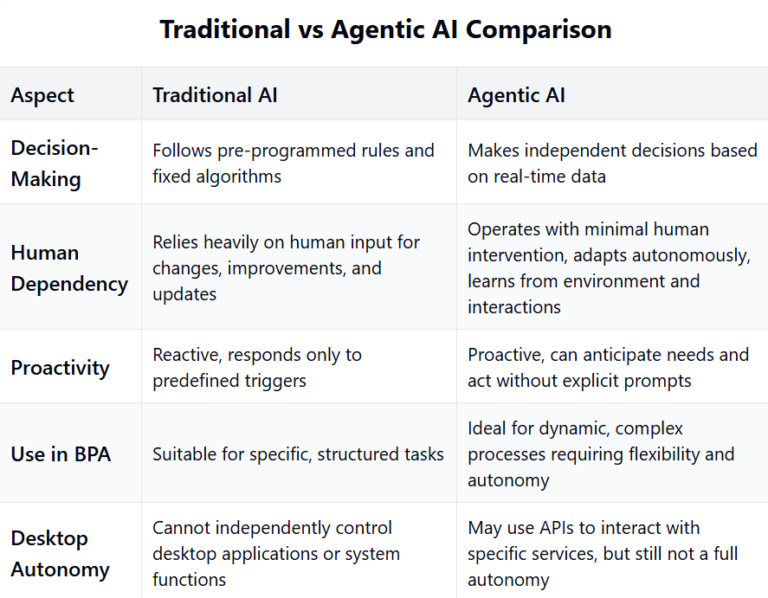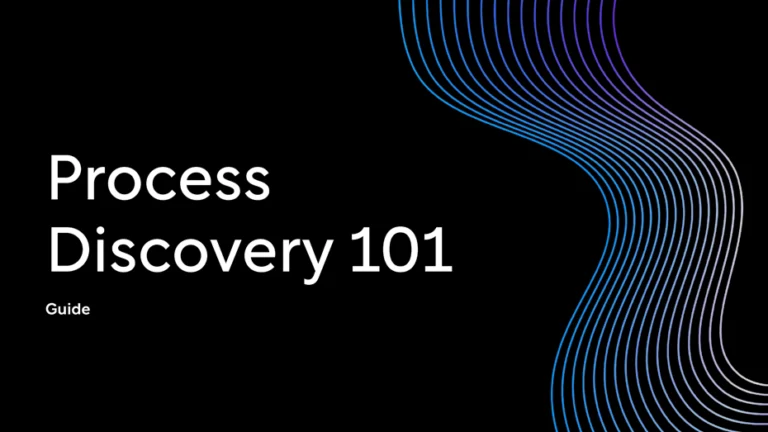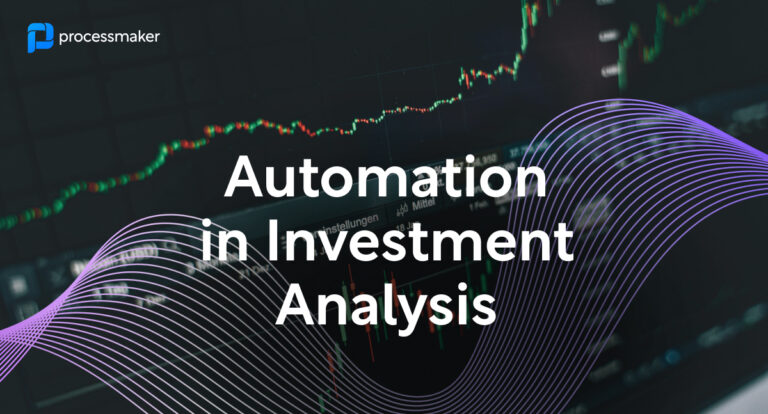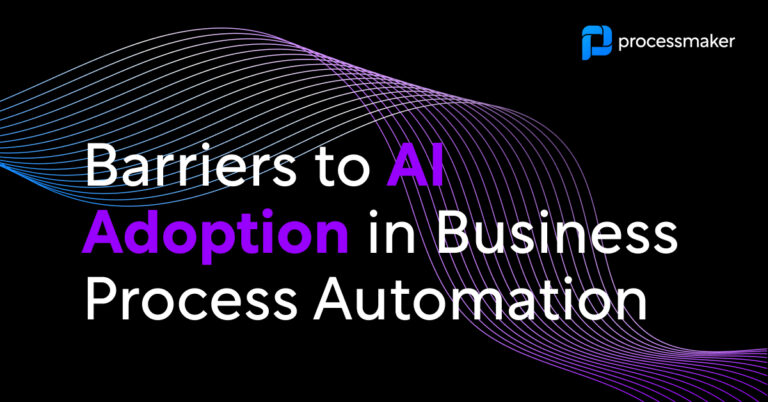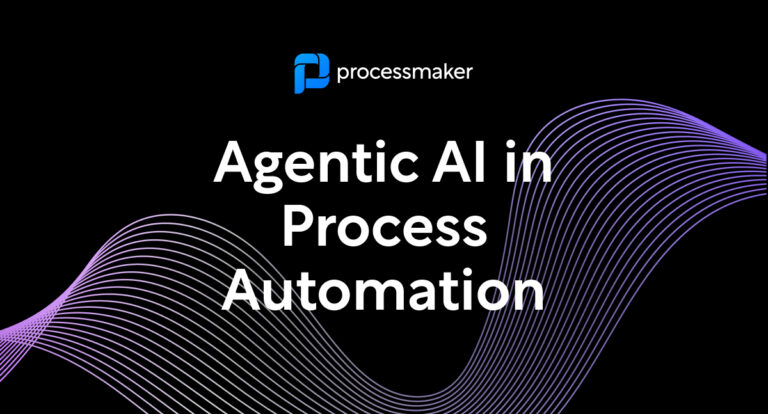What Exactly is Agentic AI?
Agentic AI is an advanced form of artificial intelligence that autonomously performs tasks and entire processes without human intervention. Unlike traditional AI, which follows strict programming or relies on human input for adjustments, Agentic AI has a level of autonomy that allows it to understand context, learn from interactions, and take proactive actions.
Agentic AI is one of the key technologies that is going to disrupt the way companies automate processes today. It enables processes to become more adaptive and self-sufficient. For example, it can detect inefficiencies, recommend optimizations, or even resolve issues without manual intervention. This level of intelligence makes BPA more dynamic, allowing organizations to respond faster to market shifts and improve overall productivity.
The most sought-after part of Agentic AI is the ability to control the desktop, much like RPA has done in the past. However, instead of relying on a clunky interface to design the interaction, users can simply describe what they want, making the experience far more intuitive. This will be the absolute biggest trend in 2025 affecting business process management.
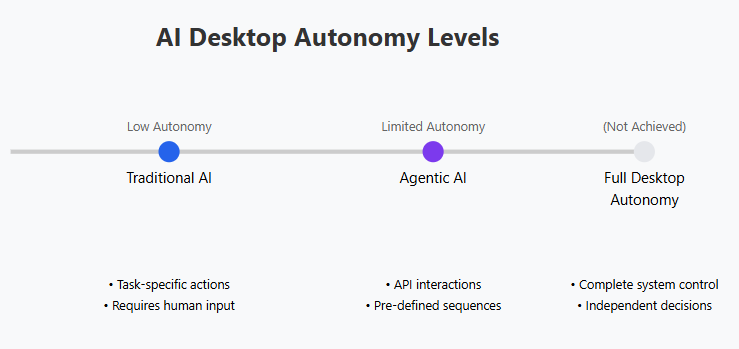
What to Expect?
Several leading AI companies are developing agentic AI systems that enable large language models (LLMs) to control desktop environments and perform tasks autonomously:
- OpenAI’s Operator: OpenAI is preparing to release an autonomous AI agent code-named “Operator.” Scheduled for a research preview in early 2025, Operator is designed to control computers and perform tasks independently, marking a significant advancement in AI capabilities.
- Anthropic’s Claude 3.5 Sonnet with Computer Use: Anthropic has introduced a feature called “Computer Use” in its Claude 3.5 Sonnet model. This functionality allows the AI to interact with desktop applications by moving cursors, clicking buttons, and typing text, effectively emulating human-computer interactions. Currently, in public beta, it represents a step toward more autonomous AI agents.
- Google’s Gemini: Google is developing an AI assistant named Gemini, which includes capabilities to take actions within applications. An API called “app functions” in the Android 16 developer preview indicates that Gemini will be able to perform specific functions within apps, such as ordering food directly from a restaurant without opening a delivery app. This feature is part of Google’s effort to make smart assistants more proactive and useful by executing tasks directly.
These developments highlight a trend toward more autonomous AI agents capable of performing complex tasks by directly interacting with computer systems, moving beyond traditional chatbot functionalities.
Differences Between Traditional AI and Agentic AI
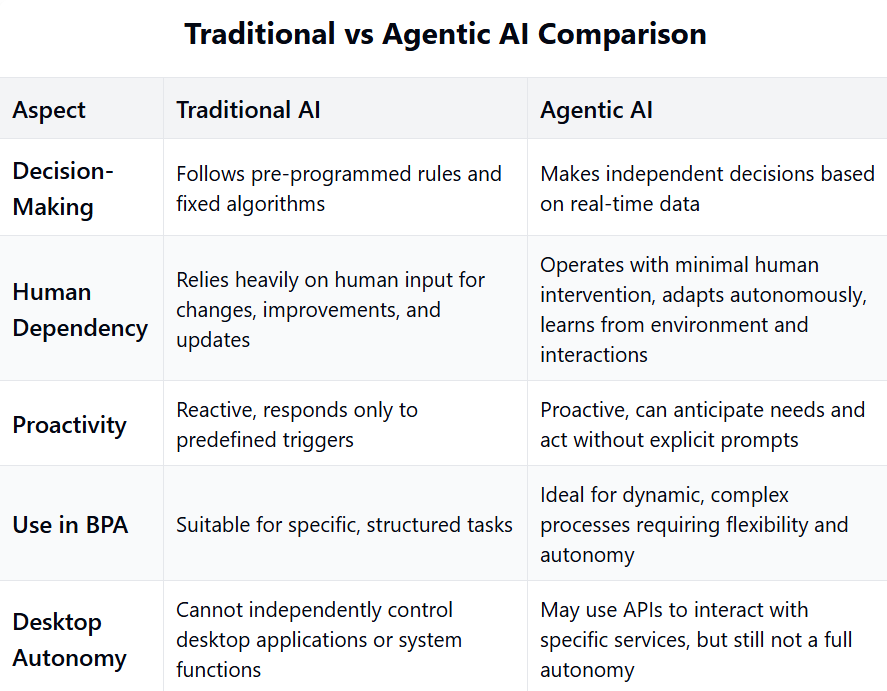
Impact on Industries
Agentic AI is about to revolutionize operations across various sectors through process orchestration.
In healthcare, these AI agents can streamline patient care by managing complex workflows – from initial appointment scheduling to post-visit documentation, while intelligently prioritizing urgent cases and managing resource allocation.
Financial services institutions are leveraging agentic AI to transform loan processing and risk assessment, with AI agents simultaneously evaluating multiple data sources, conducting credit analyses, and generating comprehensive risk reports in minutes rather than days.
In manufacturing, agentic AI is reshaping supply chain management by creating self-adjusting production schedules based on real-time demand signals, supplier capacity, and market conditions.
Retail organizations are utilizing these agents to manage inventory, predict demand patterns, and automate customer service interactions, creating a seamless omnichannel experience.
A Pivotal Moment in Process Automation
The emergence of agentic AI marks a pivotal moment in business process automation, transitioning from rigid, rule-based systems to intelligent, autonomous operations.
As organizations across industries adopt this technology, we’re witnessing a fundamental shift in how work gets done. While challenges around security, integration, and governance remain, the potential benefits – from increased efficiency to enhanced decision-making capability – are too significant to ignore.
As we move forward, organizations that effectively harness this technology while addressing its challenges will gain a significant competitive advantage in their respective markets. The future of process orchestration is not just automated – it’s intelligent, adaptive, and increasingly autonomous.
Read more about Agentic AI:
The Role of Task Mining in Measuring AI Agent ROI
The Automation Revolution: from Tasks to Processes to Complete Job Functions
